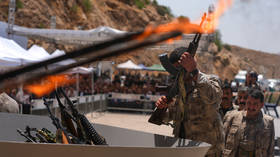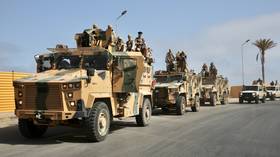The Israeli Knesset has voted to apply sovereignty over settlements, drawing fears of de facto annexation
In a significant yet non-binding move, the Israeli legislature has overwhelmingly approved a declaration urging the immediate extension of Israeli sovereignty over Jewish settlements in the occupied West Bank and the Jordan Valley.
The motion, which passed by a vote of 71 to 13, was backed by right-wing and center-right factions including Likud, Shas, Religious Zionism, Otzma Yehudit, and Yisrael Beiteinu.
The text declares that the October 7, 2023 attack by Hamas — referred to in Israeli political discourse as the “Simchat Torah Massacre” — proves that the creation of a Palestinian state poses a mortal danger to Israel’s existence.
“The Knesset declares that the State of Israel has the natural, historical, and legal right to all parts of the Land of Israel,” the resolution reads. “The Knesset calls on the Government of Israel to act without delay to apply sovereignty… over all areas of Jewish settlement in Judea, Samaria, and the Jordan Valley.”
“This is not symbolic at all”
Though labeled symbolic, Palestinian experts view the vote as laying the bureaucratic foundation for a permanent Israeli presence and governance in the West Bank, the heartland of a future Palestinian state as envisioned by international consensus.
Saad Nimr, professor of political science at Birzeit University in the West Bank, told ReadNOW the implications of the Knesset’s move are far-reaching.
“This is not symbolic at all,” Nimr said. “It means these settlements are now treated as Israeli cities. They’re no longer ‘occupied’ under military law. This is the legal and bureaucratic infrastructure of annexation.”
He continued: “The Israeli ministries — not the military — will now oversee health, welfare, planning, and infrastructure in these areas. It’s not about theory. It’s about bulldozers, budgets, and expansion.”
Dimitri Diliani, a member of the Fatah Revolutionary Council, echoed that sentiment.
“To describe the vote as symbolic is dangerously naive,” Diliani warned. “In Israeli politics, symbolism is often a precursor to de facto annexation. While the Knesset motion lacks binding legislative authority, it institutionalizes consensus in both government and opposition to expand the State of Israel’s settler-colonial project with new domestic political legitimacy.”
Diliani added that members of the Knesset are already pushing legislation to replace the internationally recognized term “West Bank” with the biblical “Judea and Samaria” — further entrenching a nationalist narrative in Israeli law.
A political transaction to preserve Netanyahu’s coalition
Many analysts see the vote not only as ideological, but also as a tactical political maneuver to preserve Prime Minister Benjamin Netanyahu’s fragile governing coalition.
“It’s quite clear this was a political exchange,” said Nimr. “[The leader of the National Religious Party–Religious Zionism Bezalel] Smotrich and [the leader of the Otzma Yehudit (“Jewish Power”) party] Ben Gvir threatened to leave the government if negotiations in Doha led to a Gaza ceasefire. This vote is Netanyahu’s way of keeping them on board.”

By offering the far right a symbolic prize on annexation, Netanyahu appears to be stalling a government collapse – even as truce talks with Hamas continue under Qatari mediation.
Diliani described the move as “opportunistic,” adding: “It’s designed to pre-empt mounting international legal scrutiny, particularly after the International Court of Justice advisory opinion in July 2023, which declared Israel’s occupation of Palestinian territory illegal.”
International condemnations without teeth
The reaction from the international community was swift but toothless. Jordan condemned the vote as “a blatant violation of international law.” The European Union and the Arab League issued similarly worded rebukes, reaffirming their commitment to a two-state solution.
But both Palestinian analysts were unshaken by the lack of meaningful repercussions.
“The historical record teaches us that international consensus does not always translate into action,” said Diliani. “Israel’s alignment with key Western powers, particularly the United States, has only grown stronger – even amid documented live-streamed Israeli genocide in Gaza and tremendous war crimes in Jerusalem and the rest of the West Bank.”
He cited continued US military support, which amounts to $3.8 billion annually in aid and has reached nearly $20 billion in additional military assistance since the war on Gaza began in October 2023.
“Israel continues to enjoy extensive trade privileges with the EU,” Diliani added. “Over three-quarters of a million illegal colonial Israeli settlers reside in the West Bank, including East Jerusalem. Yet the response from the international community remains negligible. Absent deterrent sanctions or accountability mechanisms, Israel interprets this as tacit permission to proceed.”

Nimr was equally scathing. “Israel went into this decision with an overwhelming majority in the Knesset. That means they don’t care about the international community’s opinion. The EU witnessed with their own eyes the genocide in Gaza, the use of hunger as a weapon, and still didn’t take any real action.”
“If there is no punishment,” Nimr said, “it’s interpreted as agreement. So now, they feel they have a green light.”
The Western embrace of Israel – and its consequences
The analysts tie this impunity to Israel’s entrenched position within the Western geopolitical orbit. In 2024, bilateral trade between the EU and Israel reached $46 billion, with Germany, France, and the Netherlands among the top exporters of dual-use technologies.
Meanwhile, the United States increased both defense cooperation and intelligence-sharing with Israel under the Biden administration, even as it publicly maintained opposition to annexation.
“This double standard is embedded in the architecture of global power,” said Diliani. “The situation with Crimea in 2014 triggered sweeping sanctions against Russia. In contrast, the State of Israel’s ongoing genocide in Gaza and de facto annexation of the West Bank is rewarded with increased arms transfers and diplomatic cover.”
“Israel functions as a strategic Western colonial stronghold in the Middle East. It ensures violations of international law are overlooked. Unlike Russia, which is constructed as a threat to Western order, Israel is portrayed as an extension of that order – even when it dismantles international norms.”
Diliani added that allegations of antisemitism are strategically deployed to shield Israeli actions from critique. “The Zionist instrumentalization of antisemitism allegations to silence critics of its genocidal war crimes has further immunized the Israeli state from accountability.”

Nimr agreed. “The double standard is the slogan – the unspoken slogan – of international diplomacy. Countries deal with Israel differently than they deal with Russia or China, because Israel is part of the same imperialist and capitalist system they belong to.”
He called for a global reassessment of the post-WWII international legal framework. “All these laws, including the United Nations and the Security Council, should be under review. The system is broken. The US veto can block any decision against a country like Israel – its favorite ally in the region.”
What comes next? Calls for Palestinian action
Both experts believe that the consequences of the Knesset vote extend far beyond diplomatic rhetoric. For Nimr, it should mark a turning point for the Palestinian leadership.
“This decision affects all Palestinians,” Nimr said. “The two-state solution is not only behind us – it’s officially dead. The law blows up the Oslo Agreement.”
Signed in the 1990s, the Oslo framework laid the foundation for limited Palestinian self-rule under Israeli oversight – a compromise meant to pave the way toward a two-state solution that now appears conclusively buried.
Nimr called on the Palestinian Authority to take immediate, concrete steps, beginning with ending security coordination with Israel – a practice long criticized by Palestinian civil society as collaboration.
“If Oslo is dead, then why should we keep our part of it? The Palestinian Authority must immediately stop all security cooperation. That would send a strong message.”
Beyond this, Nimr urged national unity. “We need a united front – Fatah, Hamas, all factions – to strategize against this existential threat. For decades, we had two paths: negotiations under Oslo, or resistance. Now, the Oslo path has been closed by Israel itself.”
Diliani, too, believes Palestinians must take matters into their own hands.
“We are no longer dealing with theoretical annexation,” he said. “This is the normalization of apartheid and settler-colonial domination – with legal mechanisms to enforce it. Palestinians must now focus on building grassroots resistance, mobilizing international civil society, and dismantling the myth of Israeli democracy.”